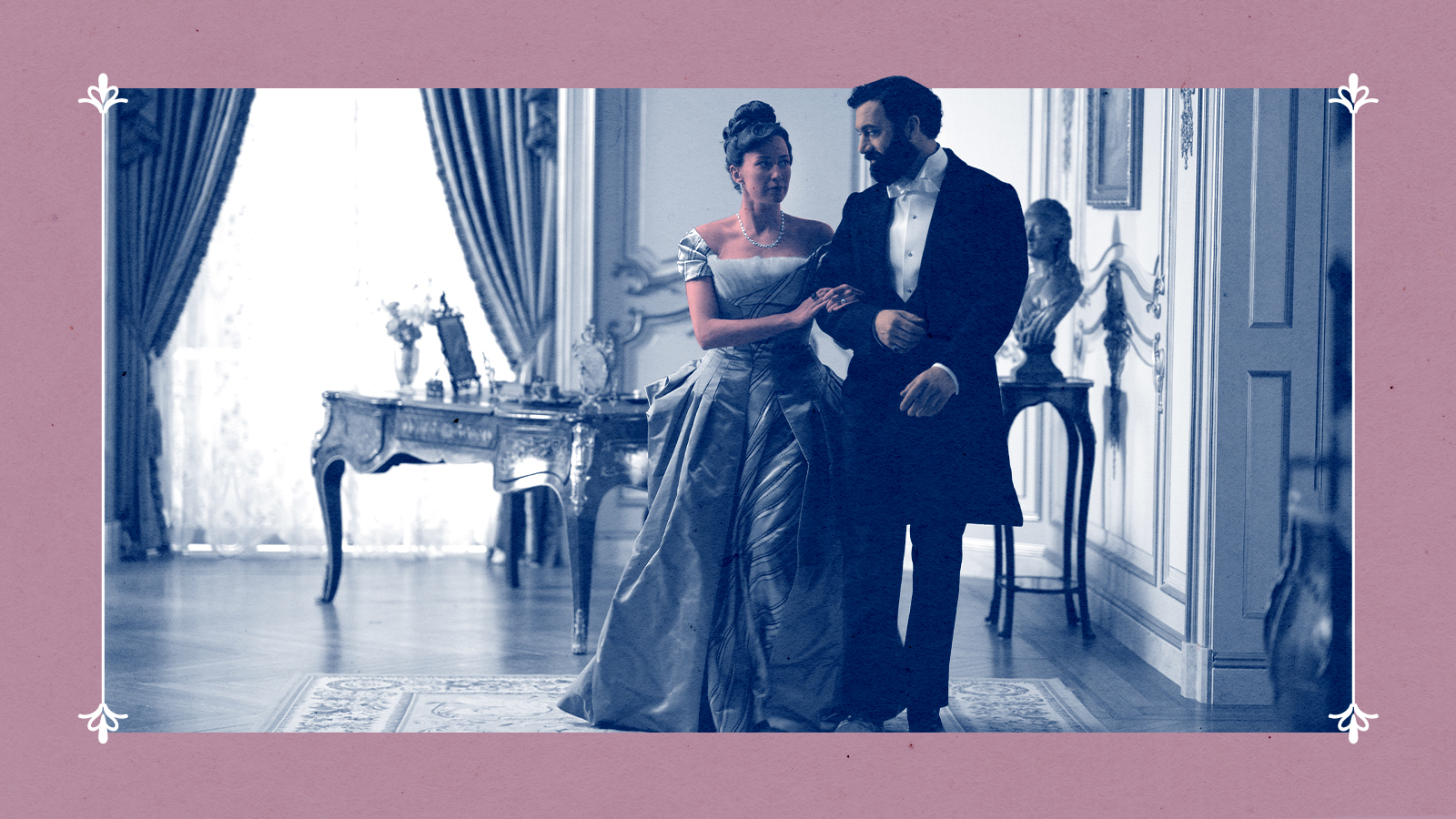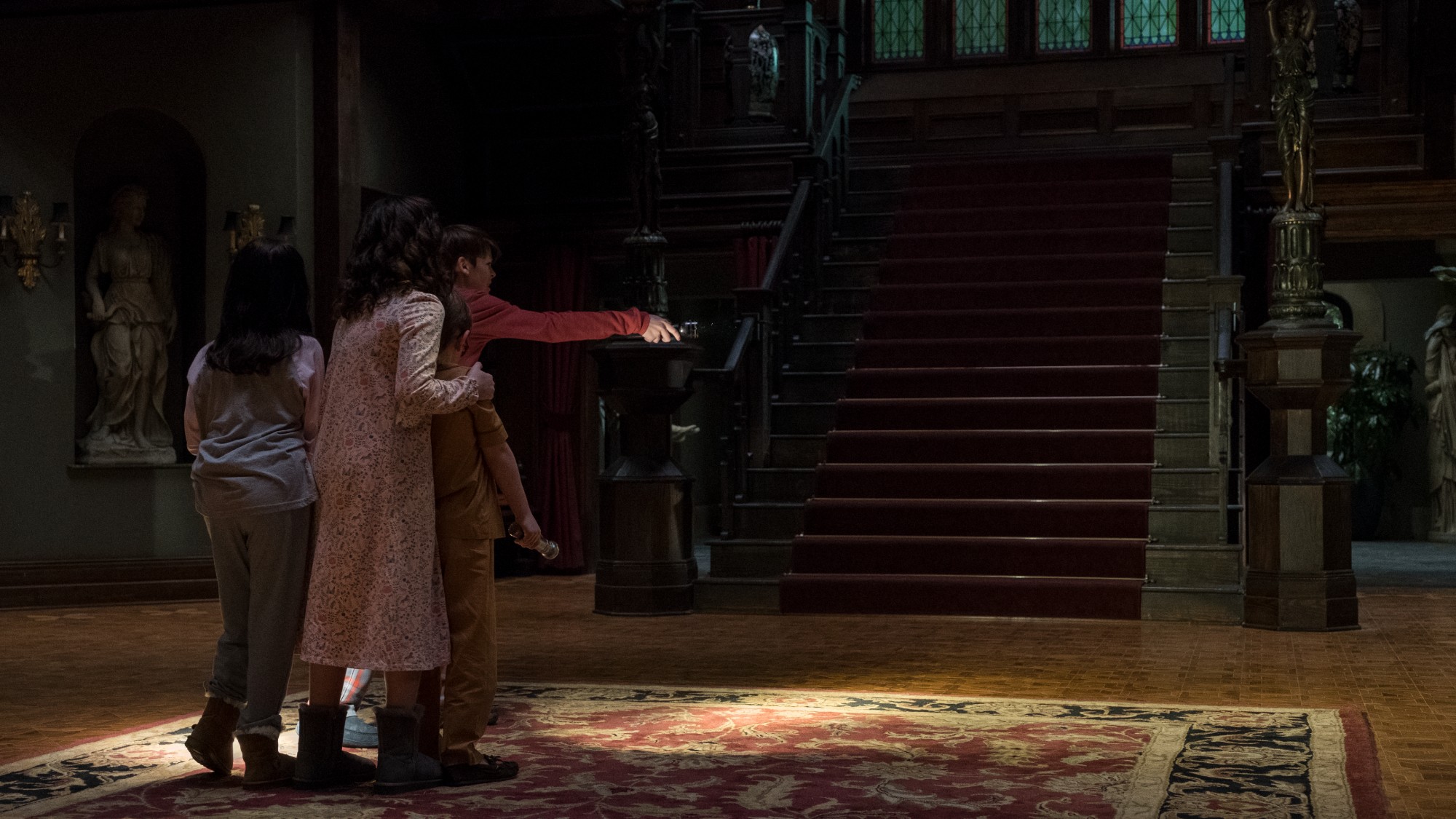The show The Gilded Age could have been
Julian Fellowes' new show should be the peak of peak TV. Instead it's 'Mean Girls' with corsets.


A free daily email with the biggest news stories of the day – and the best features from TheWeek.com
You are now subscribed
Your newsletter sign-up was successful
The Gilded Age is the perfect setting for prestige TV in the 2020s: A period that juxtaposed dizzying wealth with grinding poverty, idealistic rhetoric with pervasive corruption, and moral reformism with omnipresent corruption, the decades that followed the Civil War resemble our time more closely than any other era in American history. But television is a visual medium, and a successful show needs to be something to see as well as to think about. Happily, the period is an aesthetic feast, too, from the rich colors and patterns of its clothing (not the austere black and white we know from photographs) to the imposing architecture and luxurious furnishings of its mansions.
Unfortunately, The Gilded Age, which aired its first episode on HBO Monday, is not the show we need. Created by Julian Fellowes, best known as the creator of Downton Abbey, the series reduces the turmoil and excitement of the period to Mean Girls with corsets and tailcoats. Many elements of the production, from the vaguely anxious strings of the musical theme to the Muppet grimaces that greet every faux pas, are borrowed from Fellowes' earlier hit. But without that show's superb cast and the magic it derived from shooting in a real great house, it's hard to care who's going up and who's headed down in the social roller coaster on which the characters chug along.
What's not repeated from Downton Abbey is largely derived from classic literature from and about the late 19th century. Former English majors will recognize parallels to the works of Edith Wharton, Henry James, and perhaps less beloved authors, such as Theodore Dreiser, too. Indeed, to avoid relegation to the unfashionable genre of white people wearing white ties, the show includes an African American character who yearns to be a writer herself — though, at least in the first few episodes, her struggle to find a publisher for her work has more to do with travails of Jo March in Louisa May Alcott's Little Women than with the uncertain interlude between the end of Reconstruction and the coalescence of Jim Crow.
The Week
Escape your echo chamber. Get the facts behind the news, plus analysis from multiple perspectives.

Sign up for The Week's Free Newsletters
From our morning news briefing to a weekly Good News Newsletter, get the best of The Week delivered directly to your inbox.
From our morning news briefing to a weekly Good News Newsletter, get the best of The Week delivered directly to your inbox.
With such rich literary sources, The Gilded Age might have done better to stick with just one of the originals. Wharton and James have been adapted many times, with varying success. Except for An American Tragedy, though, Dreiser is largely untouched by Hollywood. Or what about William Dean Howells, who was genteel enough to frequent the drawing rooms of the rich, but skeptical enough to perceive their vanity and cruelty? His 1889 A Hazard of New Fortunes is among the very first novels to take New York City as its subject at a time when New England still dominated American letters.
A more recent author and book might have worked even better, though. In 1976, the iconoclastic writer Gore Vidal published a novel called 1876, set in the same milieu that The Gilded Age depicts. The juxtaposition of the titular year with the bicentennial of independence being celebrated in the year of the book's publication was not coincidental. For Vidal, that year's disputed presidential election was a sort of alternate national birthday, the point at which a ruthless modern state replaced the ramshackle confederation of 1776.
It's not that 1876 is great literature. In fact, it's not even as good as Vidal's Burr and Lincoln, to which it serves as a sequel. The best passages are witty and nasty — the author's signature mode — but Vidal does better skewering minor historical figures like Ward McAllister (who also appears in The Gilded Age) than developing his fictional personae. Like Fellowes, he tends to substitute caricature for characterization.
Vidal also abandons the juxtapositions of high society and low life that enlivened his previous work. His stand-in, Charles Schemerhorn Schuyler, visits many brothels. But he says almost nothing about the wave of immigration then in the process of transforming the city — and country. In that respect Vidal again resembles Fellowes, who uses foreign accents to denote the ethnic and cultural diversity of the period and setting but doesn't attempt to depict the rivalry, bigotry, and occasional violence that make it so evocative of our own time.
A free daily email with the biggest news stories of the day – and the best features from TheWeek.com
Still, Vidal succeeds where Fellowes fails in providing his costume drama with real stakes. Schuyler is drawn to support Democrat Samuel Tilden in the 1876 presidential race in hopes that he'll get a diplomatic post in return. But he still recognizes that the combination of corruption, voter suppression, and backroom bargaining that finally secures victory for the Republican candidate Rutherford B. Hayes represented the nadir of the founders' hopes for virtuous self-government. As a young man in the earlier book, Schuyler was beguiled by Aaron Burr's debunking of George Washington, Thomas Jefferson, and the rest as ineffectual frauds. As an old man himself, he begins to realize that they were genuinely admirable, despite their flaws.
Some qualities that marr 1876 as literature make it perfect for TV. The baggy plot, proliferation of subplots, and colorful minor characters provide plenty of material for a eight- or 10-episode season. If the showrunners were really ambitious, they might even attempt to bring Vidal's whole seven-part "Narratives of Empire" series, of which 1876 is the third entry, to the screen. Instead, The Gilded Age offers Nathan Lane using a Colonel Sanders accent as the pompous McAllister. Imagine what a different actor could do with the lovably villainous Aaron Burr.
The Gilded Age isn't entirely without charms. Christine Baranski is an acceptable substitute for Maggie Smith in the grand dame role and would be better with more to do. The recreation of the 19th-century streetscape is also impressive, if too pristine for a time when outdoor surfaces were unavoidably deluged with a combination of coal dust and horse excrement.
As The Washington Post points out, though, Fellowes doesn't seem to understand that Mark Twain and his collaborator Charles Dudley Warner coined the phrase "Gilded Age" to evoke a shiny surface concealing a worthless core. The title of the show is only too appropriate.
Samuel Goldman is a national correspondent at TheWeek.com. He is also an associate professor of political science at George Washington University, where he is executive director of the John L. Loeb, Jr. Institute for Religious Freedom and director of the Politics & Values Program. He received his Ph.D. from Harvard and was a postdoctoral fellow in Religion, Ethics, & Politics at Princeton University. His books include God's Country: Christian Zionism in America (University of Pennsylvania Press, 2018) and After Nationalism (University of Pennsylvania Press, 2021). In addition to academic research, Goldman's writing has appeared in The New York Times, The Wall Street Journal, and many other publications.
-
 6 exquisite homes with vast acreage
6 exquisite homes with vast acreageFeature Featuring an off-the-grid contemporary home in New Mexico and lakefront farmhouse in Massachusetts
-
 Film reviews: ‘Wuthering Heights,’ ‘Good Luck, Have Fun, Don’t Die,’ and ‘Sirat’
Film reviews: ‘Wuthering Heights,’ ‘Good Luck, Have Fun, Don’t Die,’ and ‘Sirat’Feature An inconvenient love torments a would-be couple, a gonzo time traveler seeks to save humanity from AI, and a father’s desperate search goes deeply sideways
-
 Political cartoons for February 16
Political cartoons for February 16Cartoons Monday’s political cartoons include President's Day, a valentine from the Epstein files, and more
-
 February TV brings the debut of an adult animated series, the latest batch of ‘Bridgerton’ and the return of an aughts sitcom
February TV brings the debut of an adult animated series, the latest batch of ‘Bridgerton’ and the return of an aughts sitcomthe week recommends An animated lawyers show, a post-apocalyptic family reunion and a revival of a hospital comedy classic
-
 The 8 best hospital dramas of all time
The 8 best hospital dramas of all timethe week recommends From wartime period pieces to of-the-moment procedurals, audiences never tire of watching doctors and nurses do their lifesaving thing
-
 The 8 best horror series of all time
The 8 best horror series of all timethe week recommends Lost voyages, haunted houses and the best scares in television history
-
 Scoundrels, spies and squires in January TV
Scoundrels, spies and squires in January TVthe week recommends This month’s new releases include ‘The Pitt,’ ‘Industry,’ ‘Ponies’ and ‘A Knight of the Seven Kingdoms’
-
 The best drama TV series of 2025
The best drama TV series of 2025the week recommends From the horrors of death to the hive-mind apocalypse, TV is far from out of great ideas
-
 The 8 best comedy series of 2025
The 8 best comedy series of 2025the week recommends From quarterlife crises to Hollywood satires, these were the funniest shows of 2025
-
 A postapocalyptic trip to Sin City, a peek inside Taylor Swift’s ‘Eras’ tour, and an explicit hockey romance in December TV
A postapocalyptic trip to Sin City, a peek inside Taylor Swift’s ‘Eras’ tour, and an explicit hockey romance in December TVthe week recommends This month’s new television releases include ‘Fallout,’ ‘Taylor Swift: The End Of An Era’ and ‘Heated Rivalry’
-
 Daddy Pig: an unlikely flashpoint in the gender wars
Daddy Pig: an unlikely flashpoint in the gender warsTalking Point David Gandy calls out Peppa Pig’s dad as an example of how TV portrays men as ‘useless’ fools
